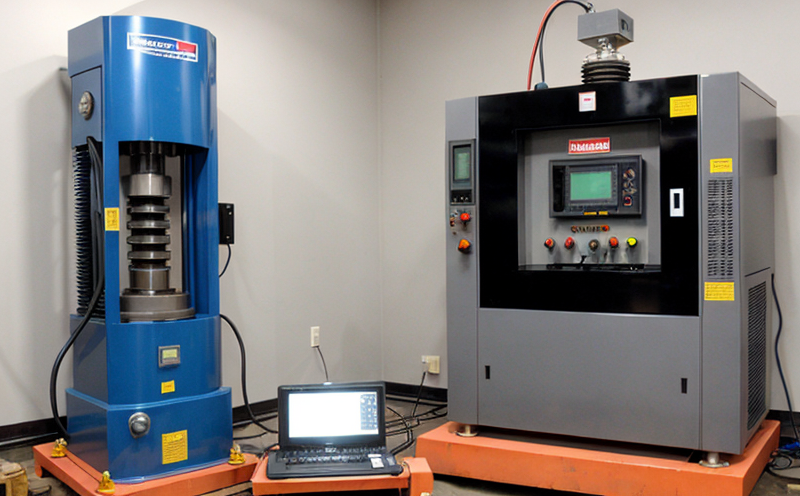ASTM F1160 Shock Testing of Medical Device Implants
The ASTM F1160 standard specifies the procedure for determining the resistance to mechanical shock of medical device implants. This testing is crucial in ensuring that devices are robust enough to withstand the rigors of everyday use, sterilization processes, and transport conditions. Compliance with ASTM F1160 not only ensures product safety but also helps manufacturers meet regulatory requirements set by agencies like the FDA.
The test involves subjecting specimens to controlled shock pulses that simulate real-world impacts such as those experienced during packaging, shipping, or handling. The primary goal is to evaluate whether the implant retains its integrity after exposure to these shocks without compromising functionality.
Given the critical nature of medical devices and their role in patient health, it's imperative that manufacturers adhere strictly to relevant standards like ASTM F1160. Failure to do so could lead to potential hazards for patients using these implants.
The testing procedure typically involves mounting the implant on a fixture designed to apply controlled shock pulses. The specifications for pulse duration and amplitude are detailed in ASTM F1160, providing precise conditions under which each specimen must be tested.
After applying the shocks according to standard procedures, engineers inspect the specimens for any signs of damage or failure. Acceptance criteria outlined in ASTM F1160 define what constitutes an acceptable outcome post-test. Compliance with these standards is essential not only for quality assurance but also for regulatory approval.
In summary, conducting ASTM F1160 shock testing ensures that medical device implants are safe and reliable under realistic conditions. This testing plays a vital role in safeguarding patient safety by verifying the durability of implanted devices against mechanical shocks.
Why It Matters
Mechanical shock and vibration testing is essential for ensuring the durability and safety of medical device implants. These devices are often subjected to various mechanical stresses during their lifecycle, from initial packaging through sterilization and final delivery to patients. ASTM F1160 provides a standardized method to evaluate how well these implants can withstand such shocks without compromising performance or integrity.
The importance of this testing cannot be overstated. Ineffective shock testing could lead to failures in critical components during use, potentially resulting in serious injuries or even fatalities. By adhering strictly to ASTM F1160 guidelines, manufacturers can significantly reduce the risk associated with these devices while enhancing overall patient safety.
Moreover, compliance with this standard is often a prerequisite for regulatory approval and market entry. Regulatory bodies like the FDA require medical device manufacturers to demonstrate that their products meet or exceed specified performance criteria before granting clearance. Thus, ASTM F1160 serves as both a technical benchmark and a legal requirement in many jurisdictions.
Additionally, this testing helps improve product design by identifying potential weaknesses early on in development cycles. Engineers can use the results from ASTM F1160 shock tests to refine designs, optimize material selection, and enhance overall quality assurance practices. This iterative process contributes to creating safer and more effective medical devices for patients worldwide.
In conclusion, ASTM F1160 is not just a technical standard; it represents an integral part of modern medical device development and manufacturing processes aimed at ensuring patient safety and regulatory compliance.
Industry Applications
| Industry | Purpose | Examples |
|---|---|---|
| Orthopedics | Evaluate implants for use in bone fractures and joint replacements. | Total hip arthroplasty, knee replacement surgery. |
| Spinal Surgery | Determine the resilience of spinal devices to withstand mechanical shocks during transport or handling. | Lumbar stabilization systems, vertebral body replacement devices. |
| General Medical Device Manufacturing | Ensure that all types of medical implants can endure rigorous testing and sterilization processes without failure. | Vascular grafts, cardiac valves, neurostimulators. |
The data provided in the table highlights various industries where ASTM F1160 shock testing is applied. It underscores the importance of this test across different medical fields, emphasizing its role in ensuring that implants are robust enough to handle real-world conditions safely and effectively.
Environmental and Sustainability Contributions
- Promotes safer use of medical devices by reducing risks associated with mechanical failures.
- Supports the development of more durable products, potentially extending their lifecycle and reducing waste.
- Aids in regulatory compliance, ensuring that all devices meet stringent safety standards before reaching consumers.
- Enhances patient outcomes through improved product reliability and reduced instances of adverse events.
- Fosters continuous improvement within the medical device industry by encouraging manufacturers to refine their products based on rigorous testing protocols.
- Contributes to environmental sustainability by promoting the use of longer-lasting, high-quality devices that minimize the need for frequent replacements or disposables.
The combination of these contributions supports a more efficient and responsible approach to medical device manufacturing, ultimately benefiting both patients and the environment.





